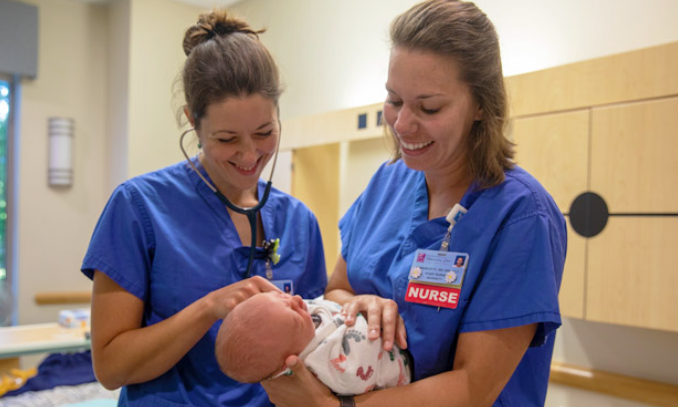Maternity care: what do maternity nurses do?

The maternity nurse, formerly also known as the maternity nurse, is your support during the maternity period. The maternity nurse provides information and closely monitors your health and recovery. Thanks to maternity care, you can recover faster from childbirth and enjoy your baby with more confidence.
Please note: changes due to the corona crisis
Due to the corona crisis, some of the information in this article is unfortunately not or less applicable. It is also possible that it is currently organized differently than discussed below.
How does it work?
Most maternity agencies will provide you with one maternity nurse who provides maternity care for you and your baby for the first eight days. This is nice because that way you don’t always have a new face around you. The maternity nurse will help you get used to your new situation and will keep a close eye on whether you and your baby are recovering well from the birth.
Duties of the maternity nurse

Maternity care consists of a number of tasks, which are performed by a maternity nurse. These tasks are:
- Assisting the midwife during a home birth or an outpatient birth
- The daily health check of you and your baby
- Consult with the midwife about your recovery after childbirth and the development of your little one
- General care for you and your baby
- Help your partner and any other children where necessary
- Providing information, advice, and tips about caring for your baby
- Receiving maternity visits
- Performing some household chores
When will the maternity nurse come?
In the case of home birth or outpatient birth, the obstetrician or general practitioner who is present will call the maternity nurse as soon as necessary. The maternity nurse assists during the delivery and after the delivery, she takes care of you and your baby.
With a hospital birth, you go home as soon as possible after giving birth without complications. When you know you can go home, you call the maternity nurse.
TIP: Not everyone clicks with her maternity nurse. Do you recognize this? Then you can indicate this to the maternity care organization and it will be checked whether you can get another maternity nurse. Do not feel hesitant to do this, it is nice if you can look back on your maternity week with a good feeling.
How many hours of maternity care are you entitled to?
The maternity week normally lasts 8 consecutive days, with a total of 49 hours of maternity care. The number of hours does not include the assistance of the maternity nurse during the delivery.

On the basis of the National Indication Protocol Maternity Care, it is checked whether there are circumstances that entitle you to more or fewer hours of maternity care. We look at what is right for you, your child, and the rest of the family. The legal minimum number of hours is 24 and the maximum number of hours is 80. The latter only happens in the case of special circumstances.
During your intake interview with the maternity center, an estimate is made of the number of hours of maternity care that you need. If your personal situation changes, the number of hours can still be revised. You can coordinate the division of the maternity care hours with your maternity nurse.
If you or your child will be in hospital for a longer period of time after the birth, check with your health insurer about what you are still entitled to after returning home.
When do you arrange maternity care?
A good time to arrange maternity care is just after the term ultrasound. This ultrasound is usually around 12 weeks of pregnancy. You then still have time to get acquainted and it gives a calm feeling when this is arranged. Most maternity agencies recommend that you apply for maternity care before week 16 of your pregnancy.
If you are additionally insured for a maternity package, you can also request it when you register. This may also be a little later, as long as you have the package in your third trimester.
Intake interview maternity care
Most maternity centers have an intake interview with future parents. This conversation takes place when you are 7 or 8 months pregnant. During this conversation, it is determined how many hours of maternity care are needed on the basis of your situation.
In addition, your pregnancy, delivery, and maternity period will be discussed with you and you can indicate what your expectations are of maternity care. You will also be told when to call the maternity office if you are going to give birth at home or in the hospital. The intake interview can take place at your home or by telephone.
Preparations for maternity care

The maternity nurse’s working environment must comply with the Occupational Health and Safety legislation. The purpose of this is that the person who takes care of you and your newborn child can do this in a safe way. For example, the minimum height of the chest of drawers must be 90 centimeters.
In many households, most conditions are automatically met. Usually, the bed still has to be brought to the minimum height of 80 centimeters. This can be done with the help of bed raisers, which you can often borrow for free from your maternity agency. This will also be discussed during the intake interview.
Is maternity care reimbursed by your health insurance?
The basic insurance of your health insurance reimburses the costs of your maternity care. In 2021, a personal contribution of $7.54 will apply for each hour of maternity care. This personal contribution can be (partially) reimbursed if you have additional health insurance that covers this. If you want more hours of maternity care than you are entitled to according to the LIP, this will not be reimbursed. You can often buy this yourself. However, the costs of this can quickly add up.








